Natalie Bakopoulos did not begin her college years with the intention of being a writer. She was a zoology undergrad, entered graduate school for physiology, was a research assistant for many of those years, and eventually began working for a science journal as an editor. When her brother, Dean Bakopoulos, put himself out into the book world, Natalie found herself saying, “I can do this, too.” She entered the MFA program at the University of Michigan, going on to publish her short fiction and essays in Tin House, Ninth Letter, Granta Online, Salon, and Fiction Writers Review. Her writing has also garnered her an O. Henry Award, a Hopwood Award, and Platsis Prize for Work in the Greek Legacy.
A child of immigrant parents—a Ukrainian mother and Greek father—Natalie’s formative years were spent firmly in the Ukrainian community of Detroit, immersed in the music, language, religion, and people. Meanwhile, her father’s Greek heritage and culture remained a mystery, as he came to the U.S. for a college education and never went back. With a proclivity towards seeking and inquiry, it is no surprise then that Natalie would gravitate towards exploring that particular set of unknown variables.
And, in exploring the variables of what makes a family stay together or move apart, what better era in Greek history than the years of the military junta, wherein people often had to fight for the ability to go on as though everything were, but nothing was, normal. That sense of domestic identity, fraying at the edges, is at the heart of Natalie’s debut novel, The Green Shore. In it, two generations of men and women observe their fragile country shatter into pieces and simultaneously attempt to keep their own family from following suit. The adults struggle with the challenges of maturity—crumbling marriages, second loves, political differences—and their children with the challenges of immaturity—new love, education, travel—all fighting to maintain their own identities in the wake of something that seeks to, and inevitably will, change their selves and their futures. But will it be for better or for worse?
When she’s not writing, Natalie serves on the faculty at the University of Michigan, reads a lot, and coins clever new words for things like social media angst (“Twilt”).
Interview:
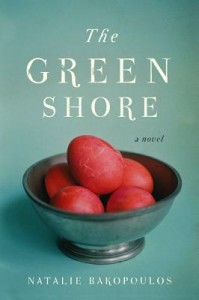 Stacie Williams: Your father immigrated to the United States from Greece in the 1960s. Did a desire to learn about your own family play into the creation of this novel?
Stacie Williams: Your father immigrated to the United States from Greece in the 1960s. Did a desire to learn about your own family play into the creation of this novel?
Natalie Bakopoulos: It’s hard to express the reasons I write what I do. I’m sure this desire played into it, but I don’t know if it was a conscious desire. I can say I felt a part of my Greek self was missing and the writing of the novel was a way to explore it and reclaim it.
What did you feel was missing?
I didn’t grow up speaking Greek, for one. I heard it from visiting friends, neighbors, etc., but because my mother is Ukrainian and her parents lived near us that’s the language I learned at a young age. So I didn’t seriously study Greek until I was in graduate school.
And I think we all have certain stories we hear about our families that shine more brightly than others, for whatever reason. My father’s uncle was a poet named Mihalis Katsaros, and my father occasionally told me stories about him, which profoundly resonated. I never had the chance to meet Mihalis, but in writing the book I had the chance to imagine and re-create a man like him.
Why this particular era in Greek history?
First, maybe I should say a few words for readers who aren’t familiar with this period, as most Americans—naturally—were paying closer attention to Vietnam during this period of history than they were to Greece. But on April 21, 1967, a right-winged group of colonels in the Greek army seized power of the country in the middle of the night. Tanks barreled through the streets of Athens, lines of communication were cut, and major streets into and out of the city were blocked. Politicians, artists, intellectuals, journalists, professors, and many others were arrested. This military dictatorship lasted, unbelievably, for seven years.
The ideology of the dictators was that Greece needed to be saved. From the threat of communism, they said, and atheism, and immorality. “A sick patient in a plaster cast,” was how the junta referred to the country.
Despite the palpable tension of military occupation always just behind the curtain, The Green Shore keeps a focus on the ordinariness of daily life. Is this a distinctly Greek sensibility, or more to highlight human nature in the face of fear—to continue on as if nothing has changed? Or was it simply the cloak of domesticity that you chose to wrap around this particular moment in time?
The truth is that under any regime people still have to live, to go about their business. They fall in love and go to school and work and make dinner and experience jealousy and rage and sadness. Anna says in the book that she knew what drove the dictators mad was that no matter what they tried, they couldn’t control what went on in private. And this is where people might have found their freedom.
I definitely think fear can motivate you to act or paralyze you, for sure, and as a writer I’m as interested in the interior lives of my characters as I am in their external surroundings. I definitely don’t think continuing on as if nothing has changed is uniquely Greek. And I wanted to be very careful to not try to make anyone a typical anything or to assign a certain sensibility to an entire nation. If anything, I wanted to create a family that felt in ways a little atypical because I think that feels more true. And essentially more typical!
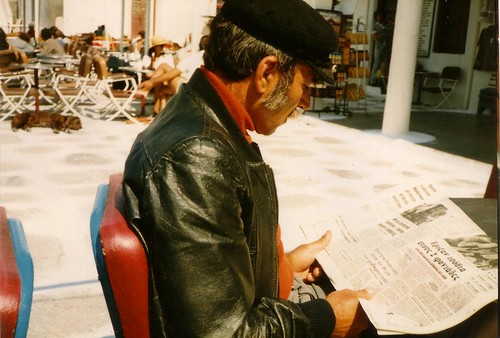
At one point in the novel, Eleni thinks, “So much energy, she realized, was spent trying to stay under the radar.” I imagine there must have been great energy spent on your part, as a writer, to focus on that mask, instead of following the rabbit hole into the complicated details of the radar’s workings. Did you feel that it took a lot of energy? Or, was it fairly easy for you to make these people your primary focus, leaving out the larger, political horrors?
The imaginative part of writing is partly exploring how characters respond to their external situations. Although real events figure prominently in the book, I didn’t want it to feel like the characters were just puppets against the backdrop of real occurrences. We know the depths of human cruelty; we know the horrors of war. The workings of the radar didn’t matter as much to me as much as the presence of that radar. I did do copious amounts of reading and research for this book and I was very careful to consider historical facts. I did. It’s important you know the facts before you begin to play with them. But I also had to do a lot of paring back, so the reader didn’t feel like I was screaming, Hey, look! I read all the right books! I talked to the right people!
I read entire books only to emerge with one tiny detail that might resonate, but the research itself still informs the work. That said, I’m not a historian or a political scientist and I certainly don’t claim to be. I want to capture what it felt like. Fiction is about emotional truth. It’s creating a new narrative, a new history.
Similarly, you often leave out the explicit details of what went on with the disappearances and the torture that took place during the junta—we see a patient at a clinic with damage to his genitals, but not the brutality of it being inflicted; a main character passes out while being “interviewed,” but the rest of his beating is implied. What did you intend with these “glimpses.”
 I think suspense comes from the little things we do know. So I don’t think such glimpses are leaving things out. I do hope they shine light on the horror of the dictatorship. Did Greeks living through that period wake up every morning thinking, We’re under a brutal dictatorship! My guess is probably no. But it doesn’t mean that they weren’t always aware of it. It’s amazing what we can live with when it’s not posing a dire, immediate threat.
I think suspense comes from the little things we do know. So I don’t think such glimpses are leaving things out. I do hope they shine light on the horror of the dictatorship. Did Greeks living through that period wake up every morning thinking, We’re under a brutal dictatorship! My guess is probably no. But it doesn’t mean that they weren’t always aware of it. It’s amazing what we can live with when it’s not posing a dire, immediate threat.
Depending on whom you ask, some Greeks would say that their lives generally went on as normal. Others would disagree. If your spouse was exiled or your son came home having been brutally beaten, you obviously were more affected. There were periods of proposed “liberalization” or lifting of censorship; professors who had lost their jobs regained them, and so on. Maybe small traces of normalcy or perpetuating a false idea of some sort of progress was what allowed the junta to stay in power for so long.
The generational crosses that the children bear of their family’s political (or apolitical) involvement since WWII splits fairly evenly among them – one fleeing (Taki), one passively observing (Anna), and one actively taking part in the resistance (Sophie). Which of the siblings would you have been? Do you identify more with Sophie, Anna or Taki?
I think it depends on the moment you ask and the time of my life! I identify with all the characters, really. Among the siblings I most closely identify with Anna and Sophie, though, but not just because they are women.
The power of art is an important theme in this book, whether it’s the artistic approach to pamphleting and leaflet-leaving, or the proliferation of creative endeavors within the confines of a prison camp—so much so that even the guards surreptitiously allow for the materials that allow the inmates to find artistic expression. What is it about these sorts of pressures and strictures that encourages the creation of art?
I think art, whether poetry or prose, painting or theatre, needs some sort of tension, both within it and as part of the creative process. During the junta, some writers chose not to publish at all, which was their own way of stopping the 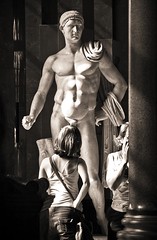 censorship that would inevitably occur. Others published only abroad. But art, like poetry, to quote Auden, “survives”; it’s “a way of happening, a mouth.”
censorship that would inevitably occur. Others published only abroad. But art, like poetry, to quote Auden, “survives”; it’s “a way of happening, a mouth.”
Art is dangerous to any Draconian regime because its messages are often implicit and nuanced. Nuance is dangerous. There’s a great scene in Before Night Falls, the film about Cuban poet Reinaldo Arenas, where Arenas’s mentor tells him: “People who make art are dangerous to any dictatorship.” Artists are counterrevolutionaries, he says, because they create beauty. And beauty cannot be regulated or controlled. This scene, and these ideas, really stuck with me.
How much time did you spend in Greece for research or simple travel and leisure? What did you love most about the country, and the people? What do you miss?
In the past decade I’ve been to Greece seven times, always in the spring or summer. Generally I go for only about two or three weeks but the summer of 2009 I was there for two months, and that’s when I think I finally finished the book. Or at least had some semblance of a complete draft.
It’s hard to say what I miss about the country when I’m gone. It’s not one thing—though surely the sun and sea are high up on that list. But I feel very comfortable there, even though in a way I’m also completely uprooted. It’s much like missing a person: sometimes you can express that you miss the way someone laughs; you can miss a voice or the way she hugs you or his crazy walk, but what you’re really missing is that person him or herself. You long for the person as a whole. For me, it’s the same with missing a place. It’s not only the place itself but the way you feel when you’re there.
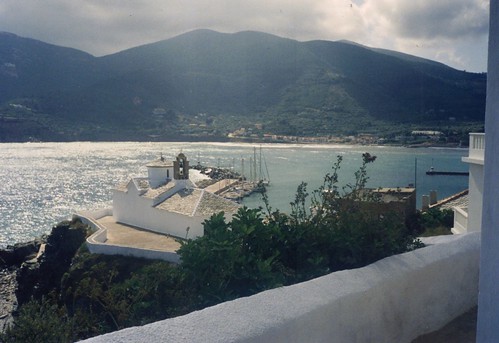
Mihalis states early on, “If you want to know the workings of a city, ask its taxi drivers.” And his best friend, Vangelis, is, of course, a taxi driver. I find this particularly interesting because the majority of taxi drivers in any urban American city are immigrants. Is that the case in Greece? And, do you have any good taxi driver stories?
Oh, I could write an entire essay about my experiences in the back of Athenian taxicabs! Most people probably could. I love taking taxis because it’s where I can practice my Greek with little inhibition; even if I make a fool of myself I can soon disappear.
Each time I get into an Athens taxi I leave with a story. Usually I am offered a cigarette. Sometimes marriage proposals. Is this the norm? Maybe so. I had one driver tell me I looked very sad and should really figure out what I wanted. I’ve talked politics and music. Poetry. One handsome cab driver asked me what it is about women that makes them want to talk about everything all the time. Why can’t we just be? He wanted to know. And so we drove around for an extra half hour, talking about it. What beautiful irony. One driver knew my uncle Mihalis’s poetry—I didn’t tell him he was my uncle—and recited the first several lines of one of his poems to me. Then he got a phone call, I got to my stop, and the cab driver told me: It’s in your heart, what matters, my girl. (In Greece, you’re a girl until you’re at least fifty.)
Generally they’re not immigrants, no. Taxi drivers in Greece are a part of a closed profession. And though in the past year or so there’s been talk about liberalization of these closed professions, it’s not particularly easy for anyone to obtain a license to operate a taxi, let alone an immigrant.
I leave things in taxis: my cell phone, a bottle of wine, a shopping bag, a book. Is this psychological, leaving parts of myself in the taxis of Athens? I don’t know.
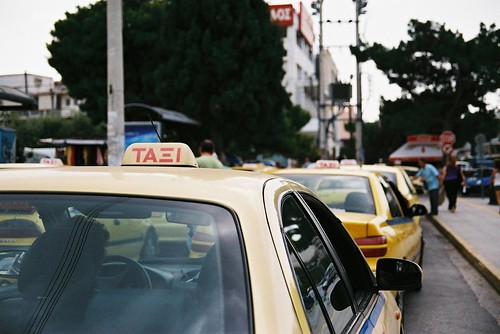
The obvious question may also be how the past relates to the current climate in Greece; there must still be a ripple effect occurring from this relatively recent political turmoil. Have you witnessed any of this up close? What might that effect be?
I don’t want to draw action/reaction parallels in such a small amount of space because there has been a lot that’s happened in the almost forty years since the junta fell. But I think during the junta people felt trapped, and I think there’s a similar sense now. The new fear now is uncertainty.
What’s interesting—and disturbing— to me is the way that, in times of uncertainty, extremes become more popular. The extreme-right-wing party called Golden Dawn is gaining popularity—as I write this I’m watching election returns and it looks like they’ve got seven percent of the vote, which will give them a seat in Parliament. Its leader has expressed admiration for the head of the junta, Giorgos Papadopoulos, and seems to look at the period with nostalgia. And both the left and the right often resort to the rhetoric of nationalism and xenophobia, whether it’s expressed in hatred toward immigrants or hatred towards Germany.
Any books you’d recommend to further explore this brief period in Greece’s history?
I’ve read a ton of nonfiction set during this period, and I am now catching up on the fiction. But two stand out to me. Nick Papandreou’s A Crowded Heart. A Crowded Heart is a beautifully written coming-of-age narrative that ends shortly after this period. Margarita Karapanou’s Kassandra and the Wolf was published on the heels of the dictatorship. I haven’t yet read Maro Douka’s Fool’s Gold, though I’m embarrassed to admit that because it’s a very important book set during the junta. Perhaps I subconsciously avoided it during the writing process, even as much as it’s been recommended to me. It’s on my list for summer reading and I’d like to try to read it in the original Greek.
How would the Greeks wish someone success?
Na eiste kala. “Be well.” Nice and simple!
Further Links & Resources
- Natalie Bakopoulos in the New York Times Opinion Page (May 10, 2012), on the recent Greek elections, “The Choice That Wasn’t.”
- Get a copy of Bakopoulos’s debut, The Green Shore — IndieBound. Powell’s. Amazon.
- Read an excerpt from the book, watch a video of Bakopoulos discussing the origins of her novel, and more over at Simon & Schuster.
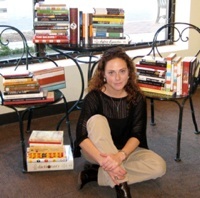 Stacie Michelle Williams has been a bookseller since 2005, working for the legendary Harry W. Schwartz Bookshops and continuing with the new incarnation, Boswell Book Company when Schwartz closed in 2009; and has been hosting/coordinating author events since 2006. A lifelong reader and writer, several of her travel pieces were published as part of the Traveler’s Tales collection Floating Through France, her interview with writer Kevin Brockmeier appeared in cream city review, and she recently served as the “Pfister Narrator,” blogging for Milwaukee’s historic Pfister Hotel. When Stacie isn’t immersed in the world of books and writing, she can be found walking her Siberian Husky, Vito, along Milwaukee’s lakefront.
Stacie Michelle Williams has been a bookseller since 2005, working for the legendary Harry W. Schwartz Bookshops and continuing with the new incarnation, Boswell Book Company when Schwartz closed in 2009; and has been hosting/coordinating author events since 2006. A lifelong reader and writer, several of her travel pieces were published as part of the Traveler’s Tales collection Floating Through France, her interview with writer Kevin Brockmeier appeared in cream city review, and she recently served as the “Pfister Narrator,” blogging for Milwaukee’s historic Pfister Hotel. When Stacie isn’t immersed in the world of books and writing, she can be found walking her Siberian Husky, Vito, along Milwaukee’s lakefront. 




